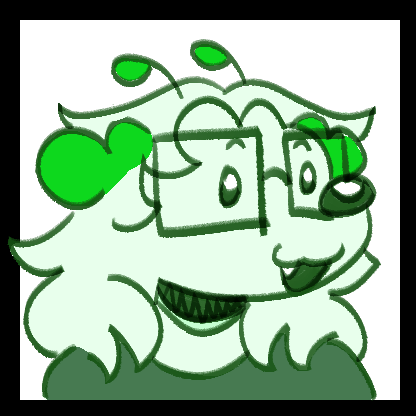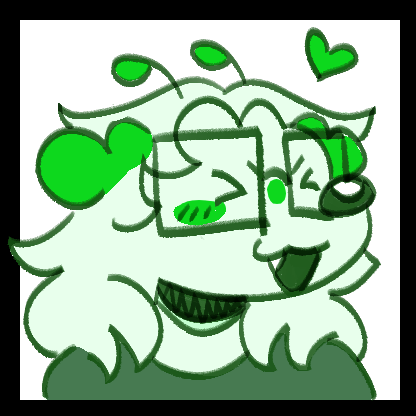
hi all ^_^ it's been quite a bit! school has just started up again, so we have been quite occupied with adjusting to our new schedule & dorm! nevertheless, we have still been working on this site, in particular, working on our plural webring, PluRing. among correcting minor typos and issues in the code to forgetting to check our email, we recently also recieved our first application that we had to deny.
well,,, that's only half true. we did eventually accept the applicant after a brief conversation, but the main point of contention was the DNI (Do Not Interact) on their website. regardless of my thoughts about the practicality of a DNI on a public website, the part that stood out to me were two words: no endos.

if you've been a part of contemporary plural spaces online, no doubt you have stumbled across similar language in a variety of DNIs across platforms. "endos", more formally known as endogenic systems, have been a point of contention and source of discourse in plural spaces for years now. but upon messaging the applicant to notify them of why they could not be accepted, they responded in a way i didn't expect, but had seen before.
they responded asking me if i could explain what endogenic plurality was to them, as they had never had the concept properly explained to them. further, they stated that when asking about the concept, they were told it was ableist and that it simply could not happen. i know people get really pissy about the transmedicalist comparison, but that was a group i was heavily involved with in my tweenage years online, and i had similar experiences around the concept of non-dysphoric transgender people. i know personally how easy it can be to use personal suffering as a way to validate one's own identity, and how this kind of thinking untimately disconnects one from their greater identity community. so i responded in earnest, explaining as best as i could the concept of endogenic plurality as a system who is (for the most part) not endogenic.
this post is basically going to be that explanation, but much further fleshed out. i want to provide a resource for people just discovering plurality, perhaps questioning their own plurality, or wanting to support a plural friend(s).
groundwork

firstly, i reccomend that you seek out endogenic resources, communities, and most importantly, systems to better understand the variety of endogenic experiences. most popular media depictions of plurality are not just completely inaccurate, but only focus on plurality as dysfunctional, disordered, and as a direct result of trauma (typically in early childhood). personally, i've only done academic reading on traumagenic and disordered plurality (as this is what's most represented in the current literature about plurality), but i have learned a lot about how wide-ranging plural experiences can be from these communities. i think it's really important to directly engage with people you don't understand in a compassionate way, to always be open to learning something new. we can't let fear stop us from finding what we have in common with each other, and we can't judge others when we don't even know them.
and secondly, i think it's really important that you reframe your concept of what a disorder is, who defines what is and isn't a disorder, and how these definitions are not 100% fact. the most commonly used diagnostic tools for mental disorders aren't written by people who experience them, but predominantly white, cisgendered, heterosexual, neurotypical men. diagnosis can be useful in terms of putting a label on a cluster of symptoms, but can also constrain experiences into a small box defined by the bias of the psychology/psychiatry institution as a whole, as well as the dominating culture of these fields. plurality is not a disorder by nature, although it can certainly develop maladaptively in response to trauma; it is a wide range of experiences spanning across backgrounds and cultures, and we cannot rely on the limited framework of a diagnosis or disorder to encompass all of these experiences.
it's a lot easier to believe that someone is plural when we can look at them and tell; when we can see that it causes dysfunction, and from our armchair, diagnose someone else. this is because we have been taught that it's inherently dysfunctional to be plural, that plural people are dangerous and frightening, that it must cause suffering, either to the individual or to others, in order to be valid. this simply is not true, and the literature around plurality is coming to reflect this. we must reflect on our biases about plurality, and about mental health as a whole. the experiences of a few plurals does not reflect the experiences of all of us.
disordered plurality is an experience of plurality that causes signifigant difficulty, distress, impairment, and/or suffering in one's daily functioning. it includes all dissociative disorders (DID, OSDD, UDD, & P-DID). it also typically includes neurogenic systems, or systems whose plurality is directly tied to another disorder. disordered plurals are generally traumagenic, but not exclusively.
non-disordered plurality is an experience of plurality that does not cause signifigant difficulty, distress, impairment, and/or suffering in one's daily functions. it's important to note that these terms are not mutually exclusive; for example, we could classify as disordered because BPD and ASD impact our plurality; but we could classify as non-disorered because our plurality does not signifigantly impact our daily function in a negative way. non-disordered plurals could be traumagenic or endogenic.
what is plurality?: origins

as defined by pluralpedia, plurality is "the state of having multiple headmates collectively sharing a single body... plural experiences are extremely diverse, and systems may vary in their origin, functions, distinction between members, member count, and internal communication". this is a pretty good definition, so it's the one i'll be using throughout this text (although many plurals may prefer different terminology for their headmates [members/parts/facets/etc], system [collective/___&/household], or even prefering terms other than "plural"!).
i'm mainly going to be focusing on the differences between system origins, as this is where the endo/traumagenic binary lies, and i feel that there are a lot of misconceptions regarding non-traumagenic origins
traumagenic systems are systems that form as a result of trauma. trauma is a key component in the development of a dissociative disorder, which has led to the misconception that trauma is required for one to be plural. one does not need a dissociative disorder to be plural, or even to be a traumagenic system. dissociative disorders are simply the categories created by the psychology field to classify plurality that causes pathological dysfunction, distress, and/or danger to the plural. adaptive system is an alternative umbrella term for systems that form as a result of overcoming some kind of adversity, whether the individual considers it trauma or not; i like this term for us because it challenges the trauma/endo binary >:3c
endogenic systems are systems that do not form entirely due to trauma, but to other non-traumatic factors. there are three main categories of endogenic systems: metaphysical/spiritual systems, created systems, and spontaneous systems (i will expand on these terms below). like with disordered and non-disordered plurality, endogenic and traumagenic plurality are not mutually exclusive; the term for a system who considers themselves to have multiple origins is mixed origins. endogenic/non-disordered systems could, hypothetically, also become traumagenic/disordered in the future.
now, many endogenic forms of plurality have roots in older internet communities; they're not new, and have been around for quite some time. although i am not sure of plural communities outside of the internet, i do know that the internet provided a way for people otherwise isolated in their experiences to come together and form a community around like-minded folk.
if you are USAmerican (or more generally Western) like me, you also know that plurality is highly stigmatized. the vast majority of Western depictions of plurals have been negative, portraying us as dangerous, unstable, and centrally, disordered. these kinds of cultural ideas in the case of mental illness can impact how it manifests, as seen in this stanford article discussing research on auditory "voices" and how they are shaped by local culture. although mental illness is not inherent to plurality, it is certainly not uncommon in plurals, and both are psychological phenomenon. just as culture can impact the manifestation of plurality, we would argue that personal beliefs/schemas do the same. this could help explain, in an empirical way, why some systems manifest in line with metaphysical beliefs.
we, for the most part, are not endogenic. we can't really speak for many of the following endogenic experiences, and have sourced our writings from what we have seen most commonly discussed in endogenic spaces. we want to respect the experiences of all plurals, even if we don't understand them, so if anyone is reading this who wants to give feedback, please email us!!!
metaphysical/spiritual systems are systems whose metaphysical/spiritual beliefs impact their plurality. typically, these are systems who believe in multiple universes or past lives which interact with them through plurality. obviously, this encompasses a wide range of belief systems and functionalities that i could not possibly do any justice to here. they may experience walk-ins of individuals from other realities, a connection to other worlds outside of headspace via portals, and/or introjects of deities or spirits. not all metaphysical plurals experience these phenomenon, but they are notable and generally unique to metaphysical plurals.

created systems are systems who are created purposefully & intentionally. this term is even more vague, and can overlap with the other endogenic categories I listed here, especially if one consciously engaged in the development of their system even if not purposely creating it. i tend to use this term to specifically reference thoughtforms, or intentionally created system members. although the term tulpa/tulpamancy is also used to refer to this phenomenon, i prefer thoughtform as it lacks connections to other existing spiritual practices.
for example, i consider myself a thoughtform ^_^ my origins as a facet are a bit more complicated, but much of my current self was intentionally created. our headspace is also partially created, due to our inability/struggle to visualize. we have found that thoughtform methods have helped us develop better techniques for internal communication, differentiation of our identities, and overall figuring out how our system works! this is why we think it's so important to have a broader understanding of plurality; it opens a door to a wide range of resources that, even if they don't entirely apply to you, can help!!
spontaneous systems are systems that simply existed from the start, or came to be for no reason. some people are born plural, or don't attribute their plurality to any external factors. As with all other categories, this one can, and often does, overlap.
what is plurality?: the midcontinuum

another factor of plurality, as stated in the definition i listed earlier, is "distinction between members". what does this mean? when someone is plural, doesn't that mean they have multiple personalities???
well, that's a quite outdated way of conceptualizing plurality. in reality, just as there are varied origins of plurality, there is variety in "how plural" a system is as well. some systems, especially disordered systems, have extremely distinct headmates that may not share memories or emotions. on the other hand, the lines between headmates for some is a bit more blurry, leaving them feeling not quite seperate enough to be plural, but not quite unified enough to be a singlet. there are lots of terms for this kind of phenomenon; plurallet, plural non-system, midcontinuum, but the most commonly used one is median.

we identify as median (although we prefer the term midcontinuum) to some extent; because our plurality is influenced by our BPD, our sense of self is fractured, but not entirely seperated. our parts, although distinct enough from the core to be considered parts, are not distinct enough to be their own individuals. we all stem from, and are in some way connected to, the core. we share most memories, but remain more distinct in terms of emotional experiences and schemas, or ways of conceptualizing the world.
what is plurality?: community

all of these terms describe a wide range of experiences; so wide in fact, that there are many gaps in the plural community that we have struggled to bridge. people get so focused on having consistent experiences to validate each other that they build walls preventing those without those specific experiences from coming in. this causes a lot of strife, especially when people on either side of the wall don't even have the same definitions for the terminology they're using to describe their experiences. when people prioritize gatekeeping in their community, they exclude many members of that same community, accusing them of being fakers and outsiders.
this is bullshit. it's difficult to feel safe with your community when they feel they have the right to tell you you're not real, that your experiences aren't "valid". i get so frustrated when i see people focusing on how horrible it is that people who are different than them find community with them. because to me that's the whole point. we should be celebrating these overlaps, finding our commonalities, and protecting each other from our mutual oppressors.
who gives a shit if my experience of plurality is different than yours, who cares if plurality doesn't have to mean suffering? these are good things, these are things worth celebrating. there are lots of different ways to be and become plural, and that doesn't mean one way is right and another is wrong. we are all unique and different, and that's awesome :D
why is plurality?: our thoughts

thusfar we have mostly reviewed commonly used definitions for terminology self-applied to plural people, but we haven't really discussed why plurality happens. there are a multitude of theories that refer to plurality, including Schema Theory, Structural Dissociation Theory, Internal Family Systems Theory, etc. Instead of explaining these theories, we would like to offer our own. We are not licensed or accredited in any way, simply a plural psycho/sociology student, so take this as you will.
we define plurality as a state of being/self-understandings as multiple beings, marked by dissociation between emotions, cognitions, and behaviors, often accompanied with some kind of plural autonomy exhibited by plural members. let's break this definition down further. plurality is what you define it as within yourself, and there is no universal standard of plurality: we are firm believers in self-determination, and this translates here. if one understands themselves as plural, feels that their experiences are plural/align with plurality, and can benefit from a plural framework and community, they are plural. one of plurality's core traits is dissociation, which refers to a disconnect from the self (in this case, the singular self).
dissociating is something that everyone does, whether they are plural or not. perhaps you zone out during a lecture, or you are struggling with tough thoughts, feelings, or experiences that you distance yourself from. dissociation has potential to be maladaptive, a way to avoid a difficult reality, but is not inherently so. in plural people, the threshold for dissociation seems to be substantially lower than that of singlets, whether that be due to adverse experiences, other mental illness, or predisposition. plural autonomy is a word we use to describe the unique goals, personality traits, personal experiences, and agency expressed by members of a plurality. plural autonomy affirms the plural member's existance and experiences as real (at least real enough to be functional), and counters the implication that dissociaton results in someone becoming "broken" or "less than whole", and that the experiences of plural members are simply delusions or their actions simply reactions to trauma. plurality is not inherently dysfunctional, it is a state of being that encompasses a wide range of experiences. i believe that although many of the plural experiences i discussed previously have not been explained by empirical research, that does not mean they are not worth discussing and sharing. we believe that all plurals can benefit from an inclusive use of the term "plural", and that we all serve to benefit from knowledge shared by those whos experiences with plurality may not align with our own. all plural experiences are valuable, and that shared knowledge of how to accept one's selves as plural is, in our opinion, crucial to a diverse plural community. we believe that this definition of plurality, particularly in the light of all the discourse around the origins of the term and who it can apply to, serves the plural community best by centering the autonomy of all plurals and their members, as well as including a wide range of experiences that could be considered plural.
we believe that plurality itself is an experience consisting of multiple spectrums. one of those spectrums, as discussed previously, is origins. traumagenic origins, like adaptive, refer to plurals who originate out of adversity or trauma, often referring to disordered systems who fit diagnostic criteria for a dissociative disorder. endogenic origins, then, include any plural who originates for reasons aside from trauma, such as spontaneous, created, spiritual, or cultural. Origin microlabels, like xenogenic, and mixed origins are of note as well. Our second spectrum of plurality is complexity. this involves things like member count, headspace layout/layering/barriers, fragmentation/stability of members, and communication between members. this spectrum is most directly connected to dissociation, as these traits are more likely in plurals with lower dissociation thresholds. the third spectrum is functionality, in other words, how well a plural can function in everyday life. this spectrum includes co-operation (unique from communicatuon, as it involves members communicating and acting in correspondance with each other), distress/disorder experienced by the plural, social capacity/satisfaction (the plural is happy with their social capacity, does not necessitate socializing or masking if the plural simply does not want to), and member satisfaction (the members of the plurality are happy with their functionality). this spectrum centers the perspective of the plural, rather than allowing others to assign disorder to them arbitrarily. if the plurality feels that they are working harmoneously, regardless of how many members there are, what forms those members take, and what functions those members perform, then there is no reason to interfere.
this theory of ours is incomplete, and although it does have some level of academic grounding, the simple fact of the matter is that there is a substantial gap in recognition and research between traumagenic/disordered plurals and endogenic/non-disordered plurals. we cannot worship the DSM and wait for academic journals written by singlets to come out validating our existence, we need to start doing this ourselves. we truly believe that the future is plural, and that as stigma slowly begins to fade around plurality, we will start to see acceptance for any being who feels more than one, regardless of why or how they got there.
conclusion

if you have gotten to the end of this long, long blog post, thank you so much for reading! i hope this has been somewhat informative, and that you can come away from this learning something new! i would like to leave y'all with some further reading i referenced and found in the writing of this little article:
“Here’s Dissociative Identity Disorder, and we’re not that”: a constructivist grounded theory exploration of multiplicity experiences by Z. Eve et al.
How Do I Know If I’m Plural? by The Dragonheart Collective
we will be working on more posts like this in the future, so stay tuned!!